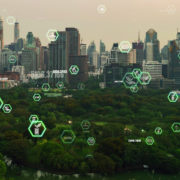AI and Internet of Things Integration: Paving the Road to Smart Environments
Smart cities are changing the way we think about urban development. By integrating advanced technologies such as the ...
- October 1, 2025
- Prime News EN


October 1, 2025
Smart cities are changing the way we think about urban development. By integrating advanced technologies such as the Internet of Things (IoT), Artificial Intelligence (AI), and data analytics, these connected cities optimise resources, improve services, and create sustainable ecosystems that benefit citizens, businesses, and governments alike.
For municipalities, businesses, and residents, the rise of smart cities signals not just a technological shift, but a fundamental reimagining of how urban life is planned and delivered. In this article, we’ll explore how these technologies develop smarter and more sustainable urban solutions.
A smart city is an urban area that leverages technology and data to improve the quality of life for its citizens and businesses. It’s where innovation merges with sustainability. These environments harness digital infrastructure and data-driven solutions to increase efficiency, reduce environmental harm, and enhance overall quality of life. The European Commission defines a smart city as a place where traditional services are strengthened and made more sustainable through digital technologies.
At their core, smart cities integrate IoT sensors, interconnected devices, and intelligent platforms that collect and process vast amounts of data. This information enables policymakers and city planners to make responsive decisions about energy systems, mobility, waste collection, healthcare services, and more. As a result, these urban ecosystems become adaptive, inclusive, and highly connected.
Smart city solutions rely on technology, analytics, and citizen engagement. Let’s take a look at their most important characteristics:
– Connectivity and IoT: Sensors and networks gather real-time data on mobility, air quality, energy usage, and infrastructure health.
– Data-driven decision making: AI and advanced analytics allow authorities to translate information into actionable insights for efficient governance.
– Sustainable infrastructure: From smart buildings with energy optimisation systems to renewable energy integration, sustainability lies at the foundation.
– Smart mobility: Autonomous vehicles, bike-sharing schemes, and AI-driven transport systems reduce congestion and emissions.
– Citizen engagement: Digital platforms empower residents to participate in governance, report grievances, and contribute to the planning process.
– Enhanced public services: Technologies streamline healthcare, security, waste management, and water usage to deliver better services at lower cost.
IoT is the backbone of every smart city solution. With billions of connected devices, IoT enables real-time monitoring, communication, and automation. Its applications include:
– Data collection and analysis: From energy grids to environmental factors, IoT turns fragmented data into a comprehensive view of city life.
– Smart energy management: Grids respond dynamically to usage, integrating renewable sources and providing personalised insights to consumers.
– Transportation optimisation: Real-time traffic updates, connected transit, and smart parking systems dramatically reduce inefficiencies.
– Environmental monitoring: Sensors track pollution, temperature, and air quality to improve liveability and inform green policies.
– Safety and infrastructure management: Predictive alerts support maintenance, while smart surveillance bolsters security.
Mobility of the Future
Urban mobility is a key challenge. Smart cities address it by integrating intelligent traffic systems, connected public transport, and digital payment platforms. These solutions ensure efficient journeys, reduce congestion, and limit emissions. Autonomous vehicles and urban air mobility are expected to play an increasing role in the next stages of adoption.
Eco-friendly Infrastructure
Connected cities prioritise buildings and networks that minimise energy use. Through smart grids, digital twins, and adaptive lighting systems, cities reduce resource consumption while supporting renewable energy adoption. These innovations are core to reducing ecological impact.
Data-Driven Decision Making
IoT-powered data collection allows governments to monitor traffic patterns, energy usage, and waste systems in real-time. This flexibility ensures cities respond proactively instead of reactively, adapting to shifts in demand and emergencies. AI tools even enable generative design, offering city planners multiple sustainable scenarios before they make final decisions.
Improved Public Services
Smart waste management powered by sensors reduces unnecessary collection runs, lowering both costs and emissions. Similarly, smart water systems detect leaks and monitor consumption, ensuring conservation and efficiency at scale.
Citizen Participation and Transparency
By leveraging digital platforms, residents gain access to feedback channels and decision-making processes. This fosters improved trust, accountability, and collaboration between local authorities and those they serve.
Resilience in Crisis Management
IoT and predictive analytics allow faster emergency response. Whether it is natural disasters, fires, or public health threats, connected infrastructures ensure informed interventions that safeguard human life and reduce disruption.
Smart cities provide tangible advantages for citizens and businesses across multiple dimensions, reshaping urban living in meaningful ways. They deliver a better quality of life through more efficient healthcare systems, improved mobility, and enhanced public services that make everyday life smoother and more accessible. At the same time, they promote environmental sustainability by lowering emissions, reducing resource waste, and integrating greener infrastructure to minimise ecological impact.
These connected cities also open up significant economic opportunities by attracting investment and fostering innovation-driven employment. In addition, they enable more responsive governance that strengthens transparency and builds trust between authorities and residents.
Despite these clear benefits, connected cities face significant challenges that must be overcome to ensure long-term success. One of the main issues lies in infrastructure and financial constraints, since replacing older systems and scaling new technologies require substantial investment. Cybersecurity and data governance are also pressing concerns. The protection of sensitive information against external threats demands strong frameworks for privacy and ethical data use.
At the same time, governance and strategy alignment are critical, as cities must establish clear policies and ensure effective collaboration between public and private stakeholders. Social inclusivity represents another challenge, as the digital divide risks excluding some citizens from fully accessing smart services. Finally, future-proofing projects remains vital, since the rapid pace of technological innovation requires smart city initiatives to be adaptable in order to stay relevant and scalable over time.
Building a smart city is not a solo endeavour. It demands expertise in integration, strategy, and execution, an area where IT consulting plays a critical role.
– Strategic vision and planning: IT consultants help cities define long-term strategies, craft roadmaps, and align objectives with local needs.
– Technology integration: They ensure that legacy systems, new platforms, and IoT devices work together seamlessly.
– Cybersecurity and data management: Consultants establish data governance protocols and secure infrastructures against emerging threats.
– Project implementation: Professional oversight prevents costly inefficiencies and ensures projects remain on track.
– Stakeholder engagement: Consultants foster collaboration between authorities, businesses, and citizens while promoting communication and awareness.
By partnering with IT experts, cities can unlock faster implementation, reduced costs, and improved project success rates. Smart cities are not just about technology but about creating better places to live.
At Prime Engineering Poland, we deliver the IT and engineering expertise that shapes the future of smart cities. Join us on the path towards a smarter, more connected future. Request your quote today!
Smart cities are changing the way we think about urban development. By integrating advanced technologies such as the ...

Smart cities are changing the way we think about urban development. By integrating advanced technologies such as the ...

Please update your browser for the best experience and visualisation of this website.Update your browser now